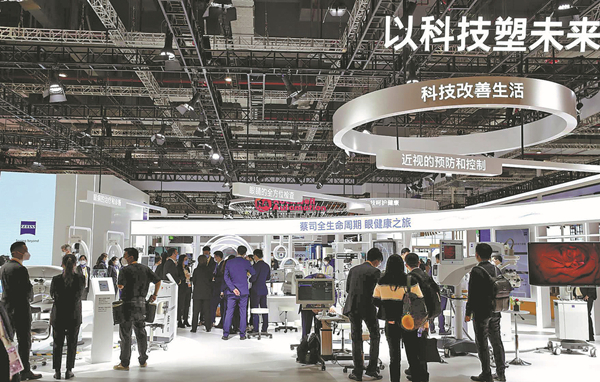Upbeat foreign companies increase in China

A view of the booth of Zeiss Group during an expo in Shanghai. [PHOTO by ZHANG WEI/CHINA DAILY]
BEIJING -- More and more foreign companies are increasing their investment in the gigantic market of the world's second-largest economy with optimism about the Chinese economic outlook on the rise.
In January, German luxury carmaker Audi AG launched pre-mass production at its first production base for purely electric vehicles in China.
In March, a Mercedes-Benz and BMW joint venture was established in Beijing, with plans to build at least 1,000 supercharging stations and around 7,000 high-power charging piles by 2026.
Also in March, German optical systems and optoelectronics manufacturer Zeiss' largest Quality Centre of Excellence in China opened in Dongguan city, South China's Guangdong province.
The newly-unveiled Flash Survey by the German Chamber of Commerce in China showed that foreign companies in China are more optimistic about China's economic prospects than they were last year.
Among 186 German companies surveyed, 84 percent expected the Chinese economy to improve or maintain its performance in the next six months. More than half of the surveyed enterprises planed to increase investment in China in the next two years, and 27 percent anticipated to maintain the scale of investment.
Optimism of American investors is growing, as shown in the China Business Climate Survey Report released by the American Chamber of Commerce in China (AmCham China) in February.
According to the report, China's market remains significant, with half of AmCham China members viewing it as one of their top three global investment destinations, a 5 percentage points rebound. China is "an important source of talent and innovation that helps American companies boost their global competitiveness," said the survey.
The report also found that although challenges remain, most members are maintaining their manufacturing or sourcing in China and expatriates have become more willing to relocate to China over the last year.
The trend can be reflected in US food and beverage giant PepsiCo's latest investment in Xi'an, capital of Shaanxi province, Northwest China.
PepsiCo broke ground on a food production base in Xi'an on June 12. This new facility, with a projected total investment of $180 million, is the company's first factory in Northwest China and the fifth major investment in China over the past five years.
"PepsiCo has full confidence in the high-level opening-up of the Chinese market and the high-quality development of the Chinese economy. It is committed to accelerating its investment in China," said Anne Tse, CEO of PepsiCo Greater China.
Industrial observers said in addition to China's vast market, resilient industrial and supply chains, constantly improving R&D, and innovation capabilities are magnets to foreign companies' investment.
Mercedes-Benz inaugurated a new building in Shanghai in April as an upgrade of its R&D center in the metropolis, with an investment of 69 million yuan ($9.71 million).
"China is one of the key drivers for technological advancement in the global automotive industry. Over the years, we have been investing heavily in local R&D, consolidating innovation strength through industry-academia-research cooperation, and driving electrification and digital transformation," said Hubertus Troska, member of the Board of Management of Mercedes-Benz Group AG.
"As the most comprehensive R&D team outside Germany, the R&D network in China, anchored by 'dual innovative engines' in Beijing and Shanghai, has become a frontrunner in global innovation and the vane of future trends within the group," Troska added.
Maximilian Foerst, president and CEO of Zeiss Greater China, believes that China, with its open innovation system, visionary talent training strategy and policy support for industrial development, will become a major driving force shaping future technology and innovation trends.
The upbeat sentiment has been also strengthened as China's economy has sustained recovery momentum in 2024 with significant strides in cultivating new quality productive forces.
According to the latest data from the National Bureau of Statistics, in May, China's retail sales of consumer goods rose 3.7 percent from a year earlier, the value-added industrial output went up 5.6 percent year-on-year, and China's imports and exports of goods increased by 8.6 percent year-on-year, extending an upward recovery trend.
Since April, the World Bank, the International Monetary Fund, the Asian Development Bank, Morgan Stanley, Goldman Sachs, UBS, Citi, Deutsche Bank and other institutions have upgraded their forecasts for China's economic growth.
The latest measures proposed by the Chinese government to promote high-standard opening-up have opened up new space for foreign firms to invest in China. The measures include reducing the number of items on the negative list for foreign investment, welcoming foreign enterprises to participate in government procurement, promoting the secure and orderly cross-border flow of data, and extending its list of visa-free countries.
According to European Business in China Business Confidence Survey 2024 released by the European Union Chamber of Commerce in China in May, almost half of the surveyed companies reported some market opening. Respondents from the financial services industry are the most upbeat about market opening.
The opening of China's bank card clearing market is a case in point.
With a slew of opening-up measures introduced, foreign bank card clearing institutions, like Mastercard and American Express can now provide services related to renminbi bank cards by setting up commercial entities in China, instead of having to cooperate with domestic clearing institutions
"We are very optimistic about the Chinese market which is large enough, and we are confident to do business well here," said Ling Hai, chairman of Mastercard NetsUnion Information Technology (Beijing) Co Ltd, which officially opened its business in May.
Ling added that the joint venture of Mastercard will provide more differentiated and refined services and deliver expanded technology relevant to the bank card clearing business.
"China will continue to be an important contributor to global economic growth in the future, and we have full confidence in our business and investment in China," said Foerst.





 play
play